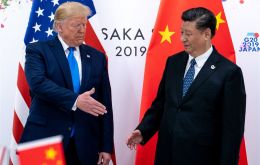MercoPress. South Atlantic News Agency
Tag: China
-
Monday, November 18th 2019 - 09:35 UTC
Beijing sends naval force with a carrier to intimidate Taiwan's presidential election

China has sailed a carrier group into the sensitive Taiwan Strait led by its first domestically built aircraft carrier as election campaigning kicked into high gear on the self-ruled island on Sunday. Taiwan's foreign minister, Joseph Wu, said they would not be intimidated.
-
Friday, November 15th 2019 - 09:29 UTC
Brazil discussing a trade deal with Beijing; Chinese company planning US$ 1bn investment in port

President Jair Bolsonaro and Economy Minister Paulo Guedes want to strengthen trade relations with China. Guedes said the creation of a free trade area between the two countries is under negotiation.
-
Thursday, November 14th 2019 - 08:50 UTC
Tusk forecasts UK will become “a second-rate player” after it leaves the EU

Britain will lose influence in international affairs and become a “second-rate player” after it leaves the European Union, European Council President Donald Tusk said on Wednesday.
-
Wednesday, November 13th 2019 - 09:48 UTC
Bolsonaro hosts BRICS summit: his heart with Trump but Brazil's economy in need of Beijing

Brazil's President Jair Bolsonaro will walk a diplomatic tightrope on Wednesday when he hosts his Chinese counterpart, as he seeks to boost ties with Beijing and avoid upsetting key ally Donald Trump.
-
Wednesday, November 13th 2019 - 08:37 UTC
Some 1.5 million jobs threatened by US/China trade war, warns port of Los Angeles

President Donald Trump on Tuesday took credit for an American economic renaissance but was greeted by another salvo from US industries that blame his trade wars for jeopardizing employment, wounding business and burdening consumers with higher costs.
-
Friday, November 8th 2019 - 08:52 UTC
China and US agree to roll back tariffs in phases, both sides confirmed

China and the United States have agreed to roll back tariffs on each others' goods as part of the first phase of a trade deal, officials from both sides said on Thursday offering a new sign of progress despite ongoing divisions about the months-long dispute.
-
Thursday, November 7th 2019 - 09:02 UTC
Three years of bonanza for meat exporters because of China's pig disease

Global meat shippers have three years to make the most of the outbreak of fatal pig disease in China before Chinese pork imports peak, according to a report released by the U.S. pork industry, which is competing for sales against Europe and South America.
-
Wednesday, November 6th 2019 - 09:45 UTC
US and China trying to agree where to sign “phase one” of trade deal

The United States and China are working to narrow their differences enough to sign a “phase one” trade deal as early as this month, but suggestions for a signing venue range from Alaska to Greece.
-
Wednesday, November 6th 2019 - 09:22 UTC
US crude stockpiles glut forces oil prices down

Oil prices dropped on Wednesday after industry data showed a larger-than-expected build-up in U.S. crude stockpiles, but expectations for an easing of trade tensions between the United State and China capped losses.
-
Wednesday, November 6th 2019 - 09:10 UTC
China will resume imports of Canadian beef and pork, PM Trudeau announces

China has agreed to resume imports of Canadian beef and pork, Prime Minister Justin Trudeau announced on Tuesday, signaling a breakthrough in their tense relations.
